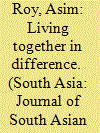| Srl | Item |
| 1 |
ID:
094011


|
|
|
|
|
| Publication |
2010.
|
| Summary/Abstract |
If history is commonly viewed as a useful tool for seeking linkage between the past and present, the politics of colonial and post-colonial India has indeed come to place pre-colonial India at the centre of historical debates in contemporary India. Despite the relative dominance of the secular liberal nationalists in the colonial and the early decades of post-colonial India, the subsequent period saw the steady emergence and rise of the 'extremist' or 'militant' Hindu supremacist ideology of Hindutva-vad, the totalising, homogenising and unhistorical political-cultural construct of the notion of Hindutva (literally, the 'essence' of Hinduism or 'Hindu-ness'). The Hindutva-vadi (literally, the propagation of Hindutva-vad) has come to represent, in practical terms, an intolerant and violent Hindu majoritarian politics. In the name of redressing the alleged 'past wrongs and injustices' perpetrated on the contemporaneous Hindus by their 'medieval' Muslim conquerors, the Hindutva-vadi particularly target the minority Muslim community. The litany of those 'medieval' Muslim 'sins', in the eyes of today's Hindutva-vadi is long, and ranged from alleged discriminatory attitudes and measures, forced conversions, temple desecrations and destructions, construction of mosques at times on those ruined temples, to outright executions and slaughters.
|
|
|
|
|
|
|
|
|
|
|
|
|
|
|
|
| 2 |
ID:
096825


|
|
|
|
|
| Publication |
2010.
|
| Summary/Abstract |
How do national and political identities impact on a state's foreign policy? In turn, how does the analysis of different normative beliefs advance our understanding of India's foreign policy during the National Democratic Alliance (NDA) period? This article utilises a norm-based approach to investigate the composite entrenched beliefs underpinning Indian foreign policy. Such an approach generates historically contingent understandings of foreign policy beliefs across different political generations and ideologies. By focusing on pre-1998 Indian government and Bharatiya Janata Party (BJP) foreign policy norms, and comparing them with the actions of the BJP-led NDA in government, the paper assesses whether differing ideological beliefs either constrain or influence (Indian) foreign policy. In particular, two elements of Indian foreign policy are analysed-dealing with Pakistan and going nuclear-in order to evaluate continuity and change in the formation and development of foreign policy in India. It is found that although the BJP-led NDA were frequently constrained by underlying norms present in Indian foreign policy, their own established policy beliefs often challenged these norms and influenced new foreign policy directions.
|
|
|
|
|
|
|
|
|
|
|
|
|
|
|
|
| 3 |
ID:
087785


|
|
|
|
|
| Publication |
2008.
|
| Summary/Abstract |
Secularism has been a defining norm for the modern, liberal Indian state. The constitutionally secular Gujarat state is believed to have undergone a paradigmatic shift in 2002, when it supported a massacre of Muslim citizens. This article investigates the empirical as well as normative state in situations of inter-religious violence. It traces the journey of the secular norm over a 45-year period, in the context of contests over identity, political ideology and socio-political dominance. The picture that emerges is much more nuanced than that projected by stark pronouncements of paradigm shifts and the inauguration of a Hindu rashtra
|
|
|
|
|
|
|
|
|
|
|
|
|
|
|
|